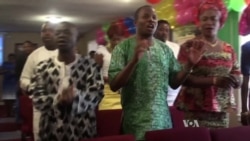Every Sunday, African immigrants fill the Redeemed Christian Church of God, RHEMA International Assembly, in Huntsville, Texas, to hear some fervent preaching and spirited singing. During the two-hour service, some worshippers may come and go, depending on their work shifts at nearby prisons.
Almost all of the nearly 300 Africans in Huntsville came to this town around 100 kilometers north of Houston for jobs in the state prison system, which is under the Huntsville-based Texas Department of Criminal Justice, the only state agency that has its headquarters outside the capital of Austin. The church preacher, Nigerian immigrant John Okperuvwe, known to all as Pastor John, and his wife, Ofuoma, both work at a nearby prison during the week.
He says many African immigrants to the United States end up living in crowded cities with high crime rates, where the cost of living is high and good jobs are hard to get. The prison jobs in Texas, while potentially dangerous, offer good benefits and pay, and the cost of living is much lower than it is in New York or Los Angeles.
“You will not get rich,” says Okperuvwe, "but you will be comfortable.”
Wearing her colorful African head wrap, Nigerian Blessing Prince may not look like someone who works in a prison, but she told VOA she has developed strong bonds with her American-born co-workers.
African workers find friendship
“When you are in the work place, your co-worker is the family you have at that point, because if anything goes wrong, he or she will come to your rescue,” she said.
She said many American correctional officers, especially African-Americans, are curious about her culture.
“I have had certain co-workers come to me and say, ’I want to learn Ibo; can you teach me to speak Ibo?’" Prince recounted. "And I say, ‘Sure, I can!’”
Pan-Africanism in Texas
The majority of African-born people living in Huntsville are Nigerians, but there are increasing numbers of people coming from other countries as well. At the church services on Sunday many congregants wear traditional clothes, like Ghanaian Peter Nyanor, swathed in a yellow robe.
“Sunday has been a day that we use to remind ourselves that we still have a rich culture back home,” he said. “Seeing your fellow people put on their attire, it reminds you of where you come from.”
He said people from various African nations come together here to recognize what they have in common, with little focus on differences.
In the same spirit, they support an African food store in a strip mall on Huntsville’s main drag. There they can buy fufu flour, dried fish and yams from Africa and some packaged products.
Religious bonds and civic cooperation
In a T-shirt shop next door to the African store, Pastor John visits the man who helped him find a location for his church. Store owner Nathan Smith is also a part-time preacher who shares the same evangelical Christian faith with his African friend.
“I am glad God led us together. Once we met it was an instant connection,” he said.
Smith has designed T-shirts for the U.S. Olympic Women’s Gymnastics Team, which trained in a facility near Huntsville. He said the town of just under 40,000 people is a bit more cosmopolitan, thanks to the presence of Sam Houston State University, which has students from all over the world.
But Smith said the religious connection he feels with the Africans is something special.
“I have met people from Africa before,” he said, “but I never witnessed an African church before and I have been over there and experienced the service and they are real humble and down to earth and they love God.”
Africans at home in Huntsville
For his part, Pastor John encourages integration into the community at large through charity efforts and civic projects. Volunteers from his church worked on a highway cleanup project, and one portion of a local road was named for them.
The church provides special help for newly arrived Africans who need help getting settled, but Pastor John also participates in projects with other Christian ministers in the community to assist the poor and needy. The church also welcomes non-Africans, with frequent attendance by white people as well as African-Americans.
As workers, as parents with children in local schools and as customers in local stores and restaurants, the Africans have developed a strong presence in Huntsville. This feeling is perhaps even stronger among their children, who sometimes remember little or nothing of Africa, and act and sound just like other American kids.
When Pastor John strolls around Huntsville’s picturesque town square, he greets merchants and friends, who recognize him as someone who has contributed to their community and with whom they share an interest in keeping Huntsville a good place to live.
HUNTSVILLE, TEX. —





